
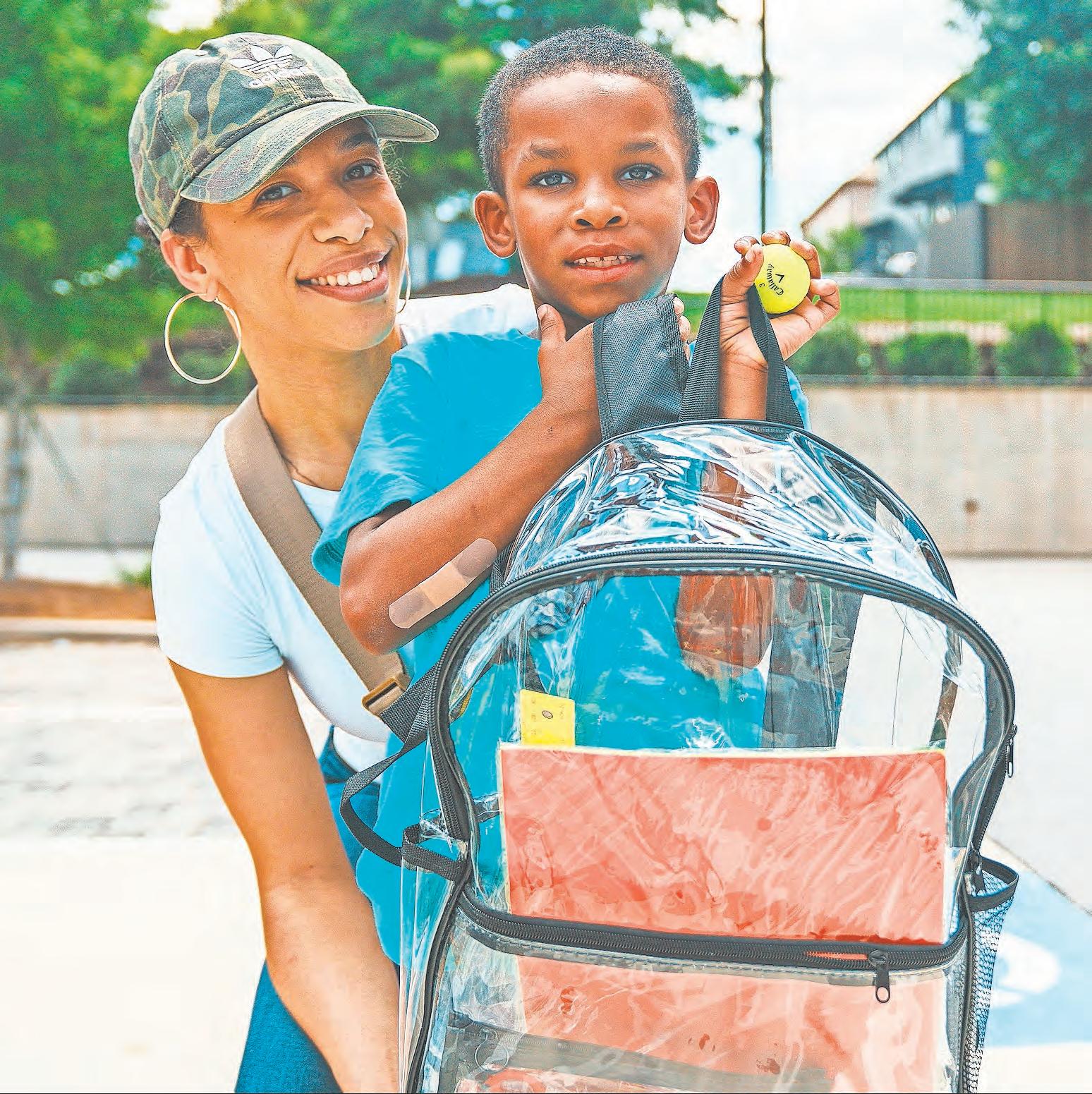



By TABIUS McCOy Report for America Corp
As summer days dwindle and the scent of freshly sharpened pencils fills the air, metro Atlanta is gearing up for a vibrant return to school, powered by a community-wide effort. In the coming weeks, families across the region will find dozens of free back-to-school events designed to equip students for success. From the bustling heart of downtown Atlanta to the southern stretches of Clayton County, the sentiment is clear: preparing children for the academic year ahead isn’t solely the responsibility of parents, grandparents, and caretakers. Indeed, it takes a dedicated village to ensure every student starts the year ready to learn and thrive.
Kicking off the preparations on Saturday, July 19, Clayton County Public Schools will host a free back-to-school school supply giveaway.From noon to 3 p.m., families can head to Southlake Mall in Morrow to pick up essential items, ensuring no child starts without the basics.
The Villages at Carver YMCA, located at 1600 Pryor Road SW, will open its doors on July 19 for a comprehensive back-to-school giveaway, running from 10 a.m. to 2 p.m., offering resources to families in the surrounding neighborhoods.
Further strengthening community bonds, the Boys & Girls Club of Metro Atlanta is set to host its second annual Back-to-School Block Party on July 19. Beginning at 10 a.m., this energetic event, held in partnership with the Joseph B. Whitehead Boys & Girls Club of Metro Atlanta, will provide fun, resources, and a festive start to the school season.

A week later, on Saturday, July 26, the tradition continues at Greenbriar Mall, which will host its 22nd annual Back-to-School Bash. This long-standing community staple, running from noon to 3 p.m., is renowned for its generous book bag giveaways, providing hundreds of students with the tools they need. Organizers anticipate significant interest, advising attendees that the line will form on the back side of the mall, conveniently located near the Fulton County Tax Commissioner’s office. Book bag distribution is scheduled to begin promptly at 2 p.m., as detailed on the Greenbriar Mall website.
Atlanta SMART Academy invites students to its lively backpack giveaway and back-to-school jam on July 26 from 10 a.m. to

2 p.m. This event promises not only essential supplies but also a celebratory atmosphere to kick off the academic year.
All the aforementioned events are completely free to attend, ensuring that every family, regardless of circumstance, has access to the support needed for a successful school year.
Chase and Emerging 100 Gear Up Summerhill for Success
Insightful conversations about financial literacy, wealth-building, and back-to-school preparation filled the lobby of the Chase Bank Community Center in the Summerhill neighborhood on Saturday, July 12. Chase Bank and The Emerging 100 of Atlanta

partnered for a back-to-school event where more than 400 backpacks filled with school supplies were handed out to children in the community.
Adults and kids alike also had the opportunity to gain insight on how to build credit, properly invest their funds, and even pick up tips on managing finances for small businesses, as JPMorgan Chase banking professionals Mathilda Lambert, Sydnee Scruggs, and Xama Gonzalez hosted workshops.
“Workshops like this prepare the younger generation so when they get older, they know how to effectively build credit and invest,” said Aaliyah Davis, who brought her nephew to the back-to-school event.
The impact of this event is deeper than just distributing school supplies. It’s an initiative to combat financial disenfranchisement that
See BACK-TO-SCHOOL on page 7
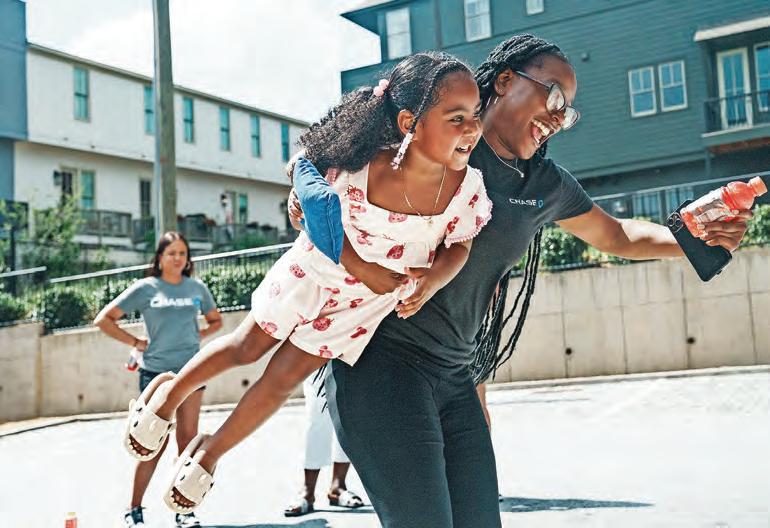
By ISAIAH SINGLETON
The Fulton County Board of Commissioners held their regular July meeting, where Fulton County taxpayers told them they cannot afford a property tax increase during mileage rate hearings on July 9.
During their June 18 meeting, on a 4-3 vote, the mileage rate proposal was set at 9.87 mills, which would raise an additional $78.9 million in property tax revenue compared to what county finance staff proposed.
The proposed 8.87 mileage rate would raise an additional $7.89 million in taxes and fund the budget the commissioners passed in February.
Residents during the meeting and via Zoom claimed that inflation and high housing costs make it too expensive to live in the county.
Fulton County resident Devin Barrington-Ward says he showed up to voice his concerns during to hold the county commissioners accountable for potential tax raises in tax breaks to big corporations like Microsoft and people like Elon Musk to build data centers that are harmful to the community.
“I’m concerned that they’re willing to raise our taxes but not make sure people who own high-end real estate in downtown, midtown, and Buckhead are paying their fair share in taxes,” he said. “I’m tired of subsidizing millionaires and billionaires.”
Ward continued to say Fulton County’s budget can’t be balanced on the backs of working-class people who are already struggling with inflation and high interest rates.
“Grocery prices are expensive, and the wages are not increasing, so at some point somebody has to ask, what gives and who are you here to serve,” he says. “As more people recognize their taxes are going up, they’re not seeing their services go up, they’re going to be pissed, and people will feel the ramifications of that at the ballot box.”
Dorothy Harp, 75, lives on a fixed income and said property taxes should be abolished for seniors aged 65 and up.
“We do not need an increase in the millage rate that’s going to knock the seniors like me out of my home. I’ve been living in that house 40 years, and I’m sick of paying the county property tax,” she said.
Sandy Springs City Council member Jody Reichel spoke to the commissioners as both an elected official and as a property owner.
“Instead of combing through the budget for savings, you’ve asked residents to pay more of a burden,” she said. “You’re telling seniors on fixed income, young families scraping to get by, and small businesses barely hanging on that they need to pay for your lack of restraint.”
Additionally, Ward says commissioners need to completely reform the tax breaks they give to corporations, put pressure on the board
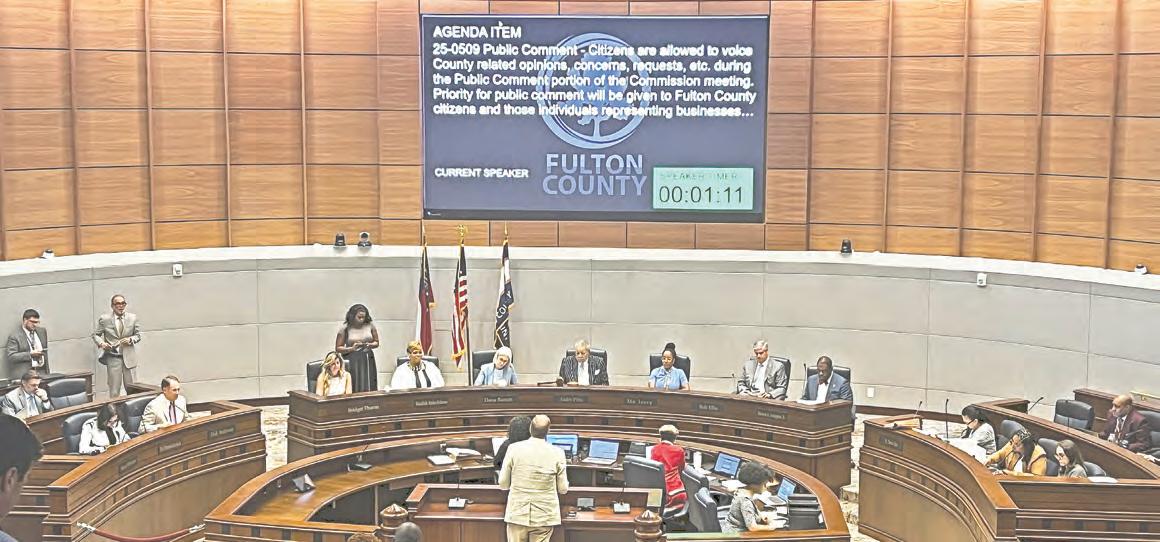

Devin Barrington-Ward, a Fulton County resident, attended the meeting on Wednesday. “I’m concerned that they’re willing to raise our taxes but not make sure people who own high-end real estate in downtown, midtown, and Buckhead are paying their fair share in taxes,” he said.
of assessors
“Tax breaks are supposed to be used to spur economic development and potentially create jobs, but if you’re giving tax breaks to entities that are going to give a tax break that’s actually going to benefit people,” he said.
South Fulton resident Amber Hawk says her homeowners’ insurance has more than tripled this year, and a mileage rate increase would

raise costs even more.
“That’s going to make it virtually impossible for my family to stay here, even with us working 40-plus hours a week, it feels like you guys are trying to push us out of our community,” she said.
Grove Park resident Mike Russell, who wants the commission to do a full rollback on property taxes, told a story about a woman in the neighborhood who can’t afford to get her plumbing fixed. Another resident down the street from Russell’s house lost power for 30 days last summer after a tree fell on his house.
He didn’t have the $10,000 needed to fix it. Their hope is to have a final vote in August, and they also hope the public pressure that has been amassed will open the commissioners’ eyes.
“It’s been a long fight, but everyone is saying the same thing, whether it’s North Fulton, City of Atlanta, South Fulton, White, Black, poor, middle-class, everyone is saying, we can’t afford it,” Ward said.
Ward adds there are several commissioners who are pushing tax increases who want to be the chair of the Fulton County Commission in the next election cycle as well.
By CLIFF ALBRIGHT AND LATOSHA BROWN
In the months since the election, funders around the country have asked our opinions on how best to fight back against the fascist assault on our democracy and to defeat Trumpism in the midterms and 2028 cycle. They ask this amidst attacks on voting rights, DEI initiatives, and on nonprofit infrastructure. The answer is not new. The answer is not to hide our beliefs, endlessly wordsmith our values to appease anti-democracy factions, or deemphasize our Blackness.
If democracy is to survive, we need to fund Black and Brown organizing consistently, intentionally, and all year long, regardless of the year. This needs to be done now, because the people who have held this democracy together are exhausted, and many of us are done waiting to be taken seriously.
Put simply, Black people are fed up. We are not going to be talked into loyalty or guilted into turning out for a system that has failed to show up for us. This is not a moment for funders or the establishment figures on the left to gamble with our power.
Currently, there’s a narrative spreading among donors that they need to shift their focus to young, white, working-class men. They are framing it as a zero-sum game, and stepping away from Black-led organizations with the false belief that we will still be there for them on Election Day. To add to this, companies and foundations that previously claimed to be proponents of racial justice have completely wiped away all public references to it since the 2024 election.
As Black organizers and leaders, how are we supposed to respond to this? They want us to put ourselves on the line — our safety, our jobs, our financial security, our communities — to build power for the left, even if that power isn’t going to benefit us. They come to us, again and again, for help, but cut us off from funding and seats at the table at the first sign of hardship.
In 2020, Black voters helped flip Georgia and deliver a Senate majority. We showed up in record numbers, again, in 2024, even as
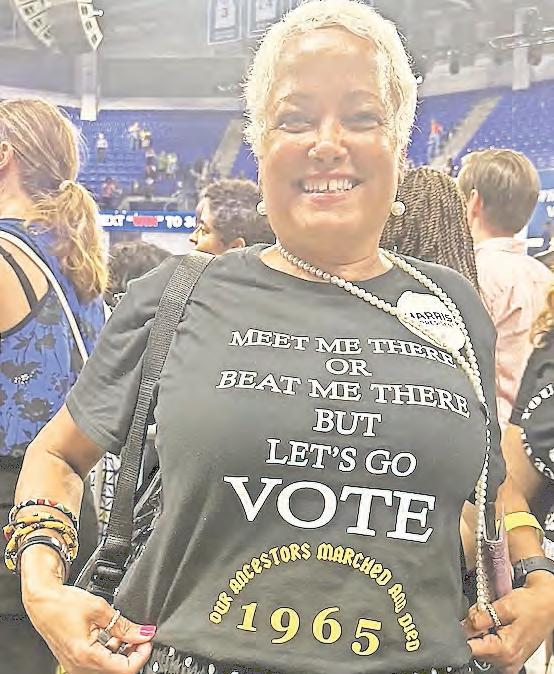
resources dwindled and investment dried up. At Black Voters Matter, we targeted video ads to more than 3.2 million voters who hadn’t cast ballots in 2020, and over 1.2 million of them turned out. On HBCU campuses, 87% of the 18- to 24-year-olds we connected with in Pennsylvania and North Carolina voted. In Georgia, that number was 82%. These weren’t “supervoters,” or high-frequency voters. These individuals were young and new voters who turned out because we didn’t just meet them in October with campaign literature, we had already been there. We build trust with our communities all year long, and that’s why our model works.
And yet, despite those results, we’re still asked to prove our worth. We are still expected to justify why Black-led, year-round organizing should be funded, and we are still watching donors move millions into television ads while local organizers work miracles with little resources.
And we’re being asked to do all of this even as our warnings about the growing impact of voter suppression have not been met with the
necessary level of urgency. Meanwhile, “experts” spin a narrative that Black turnout is solely a function of voter enthusiasm.
The reasons behind the decline in Black voter enthusiasm should not be a mystery. This decline is the logical result of political neglect and being taken advantage of. People aren’t disengaging because they don’t care, they’re doing it because they feel betrayed. If current trends continue, we won’t be surprised if future elections see the lowest Black voter turnout in a generation. This is not apathy. This is a concerted decision to step away from a relationship that demands everything but gives little in return.
Right now, Black Americans are filing for divorce. We are filing for divorce from the illusion that we are in a mutual partnership with the Democratic party and those who fund efforts around it. We are constantly asked to be the foundation of progressive organizing, yet rarely are our voices heard and responded to at the decision-making table. Why must we continue to fight to be fully funded? How many
cycles will go by before we are seen as essential infrastructure? We don’t have the energy to convince funders of our value any longer.
Less than 2% of philanthropic funding reaches Black communities. Meanwhile, the far right is investing for the long haul. According to the National Committee for Responsive Philanthropy, in 2020 alone, just 3,000 foundations supporting anti-democracy organizations held $408 billion in assets. They have a generational, long-term strategy. On the left, we have shortterm grants, late checks, or silence.
To compound this, we are now being told to hide our Blackness and change our mission. Yet, taking references to Blackness out of our mission and name is like the story of Kunte Kinte in “Roots,” when Kunta Kinte’s enslavers try to change his name to Toby. We’re asking you not to erase our Blackness, because we will refuse, but to respect and support it, and invest in racial justice.
This is about more than candidates. It’s about who’s willing to build the muscle for long-term change. That’s what we do, and it works, but we’re now refusing to do it without long-term investment and the willingness to center Black voices.
There will be losses along the way, and when those losses come, we cannot be punished for it, like we are now. The loss wasn’t because we weren’t there. The loss was because there was a lack of investment in organizing, especially in our communities. Despite this, we still showed up and worked with what we had, and are now being blamed for the Democratic Party’s issues.
If we want justice, equity, and power that lasts, funders need to do better, and groups like ours shouldn’t have to beg. Funders and Democratic leaders need to show up differently. Follow the lead of the communities that have carried this country, again and again. Stop expecting Black voters to do it alone, without resources. We’re tired and ready to step away without real change.
At the end of the day, we know the true issue at hand is anti-Blackness. Black Voters Still Matter, and we will never erase our identities.
So if Democratic funders want our support, we’ll need theirs back.
FOUNDED
May 11, 1966
FOUNDER/EDITOR
Ed Clayton Immortalis Memoria
PUBLISHER/EDITOR
J. Lowell Ware
Immortalis Memoria The Atlanta Voice honors the life of J. Lowell Ware.
PUBLISHER
Janis Ware
PRESIDENT/
GENERAL MANAGER
James A. Washington 2018-2024
EXECUTIVE ASSISTANT TO PUBLISHER
Chia Suggs csuggs@theatlantavoice.com
EDITOR IN CHIEF Donnell Suggs editor@theatlantavoice.com
GENERAL ASSIGNMENT REPORTERS Isaiah Singleton isingleton@theatlantavoice.com
Laura Nwogu lnwogu@theatlantavoice.com
BUSINESS REPORTER Tabius McCoy tmccoy@theatlantavoice.com
EDITOR AT LARGE Stan Washington swashington@theatlantavoice.com
ADVERTISING, SALES & CIRCULATION
ADVERTISING ADMINISTRATOR
Chia Suggs advertising@theatlantavoice.com
SALES
RDW Jackson rdwadman@gmail.com
CIRCULATION MANAGER
Terry Milliner
SUBMISSIONS
editor@theatlantavoice.com
DIRECTOR OF PUBLIC RELATIONS
Martel Sharpe msharpe@theatlantavoice.com
CONTACT INFORMATION
633 Pryor Street, S.W. Atlanta, GA 30312 Office: 404-524-6426 info@theatlantavoice.com


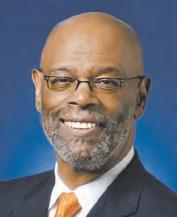
BY JAMES A. WASHINGTON
The Atlanta Voice
I wish this were original, but it isn’t. When in church last Sunday, I was blessed to hear the pastor try to address the fears many of us might have going through these tough times with the economy and the uncertainty that permeates the world today. Famine, fire, terrorists, recession, the mortgage crisis, and the like are just a few worldly issues that might keep you up at night. I was moved by his analogy regarding how we go through life and how we all ultimately go out. The pastor spoke of a man he knew who had acquired a great deal of stuff in his lifetime, only to get rid of some of it as age forced him to move into an Assisted Care Living Center for the elderly. The man was moved from that place to a nursing home and then, finally, to a hospice care center. Each time, the man had to get rid of more and more stuff. His children, early on, sometimes had garage sales. They, of course, kept something, and more often than not, as the man grew sicker and time went by, his children
threw more and more of this man’s stuff away. Well, one day the pastor visited him in the hospice center, only to see the total of the man’s possessions neatly kept in a garbage bag to leave with the man, as the pastor personally remembered how much stuff the man had accumulated at one time. And you know what? When the man died, he didn’t even get to take his garbage bag full of stuff with him. The pastor’s point was that we spend a lot of time trying to accumulate things and then more time worrying about losing them; in fact, we worship a God who does not give us this worry or accepts this fear. There is joy in knowing, or at least there should be, that the God we serve indeed supplies our needs.
Now, this doesn’t mean that our
day-to-day struggles aren’t real. They are. But how we deal with them was the point of the sermon. I have come to believe 2 Corinthians 12:9-10. God shows up in our times of weakness.
If we recognize and understand that our stuff is not all that important, God shows up with ample supply; our manna for the day, if you will. If you’re honest with yourself, He has until this point in your life. The angst of today’s problems should be replaced with peace of mind, and when the world is out of control, you should demonstrate your faith. In the world? Or, in God? That question is only necessary if you are unsure of the answer. Worry comes with the world. And the world, because of sin, is chaotic. Peace of mind comes via the Lord because the Lord is
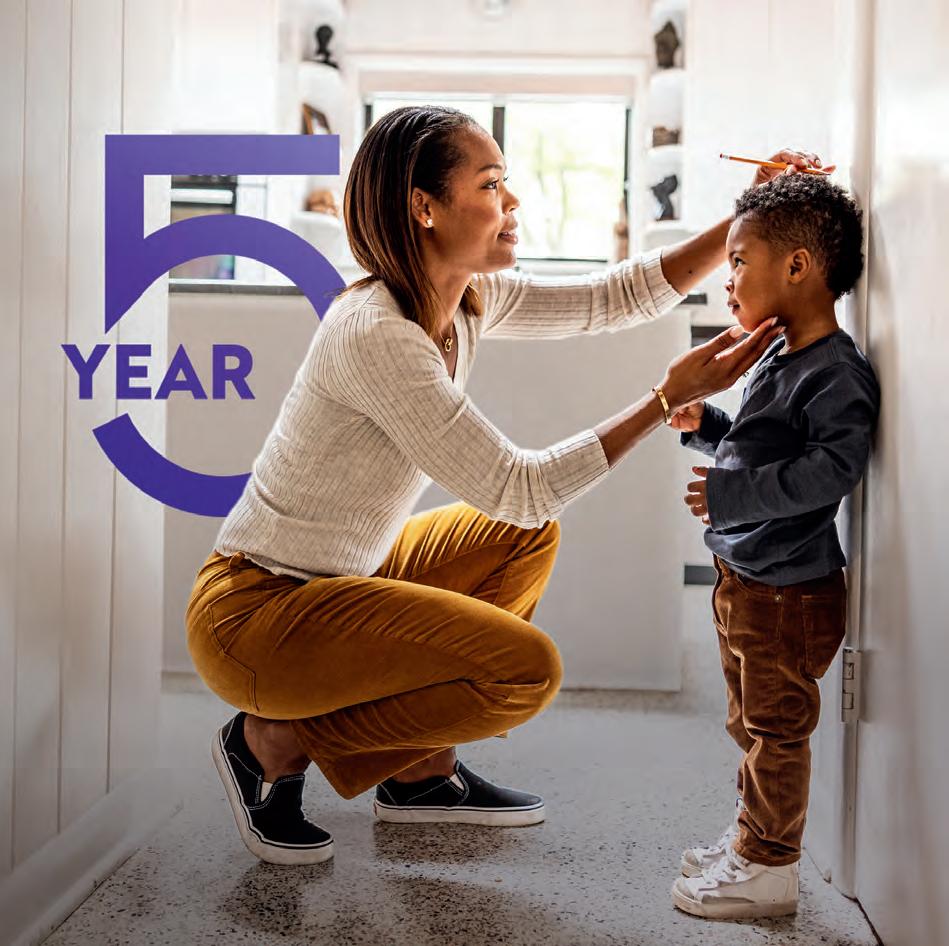
anything but chaotic.“Examine yourselves to see whether you are in faith; test yourselves. Do you not realize that Christ is in you, unless you fail the test? And I trust you will discover that we have not failed the test.” 2 Corinthians 13:5-6. Now that Christ is in you, let’s take another look at the chaos on Wall Street. The stuff in your garbage bag is going to be left behind anyway. When you arrive in heaven, you will not have any luggage. May God bless and keep you always.
This column is from James Washington’s Spiritually Speaking: Reflections for and from a New Christian. You can purchase this enlightening book on Amazon and start your journey toward spiritual enlightenment.


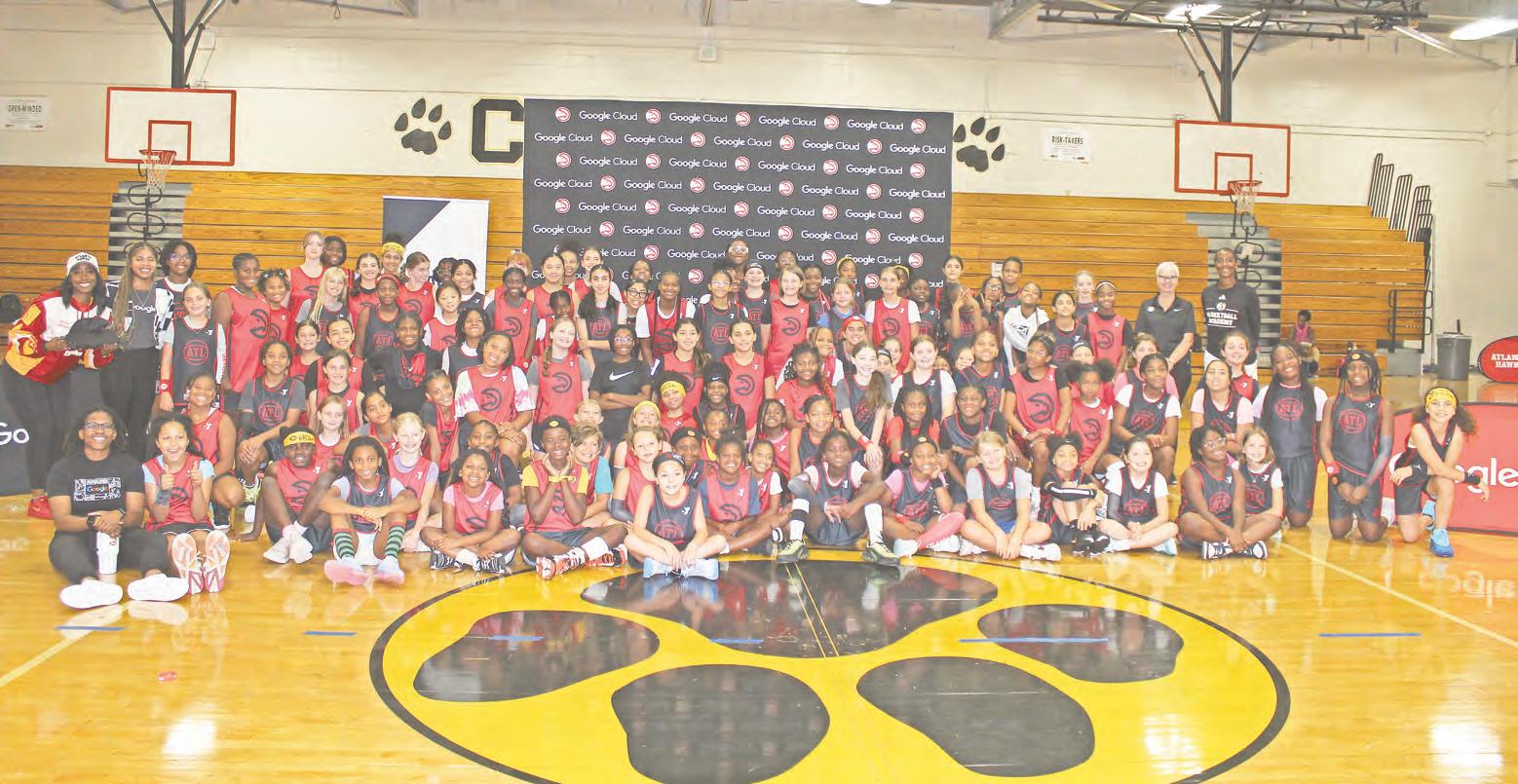
By LAURA NWOGU
The sound of squeaking sneakers, the whoosh of basketball nets, and the excited shouts of young female athletes filled the courts of Sutton Middle School on Wednesday morning during the Lady Ballers Summer Hoop Fest. Powered by Google, the annual week-long event organized by the Atlanta Hawks and College Park Skyhawks hosted 100 girls ages eight to 15 from the metro Atlanta area as they put their basketball skills and their STEM knowledge to the test. The Wednesday event featured drills, competitions, and Google-led STEM activities aimed at empowering the young ballers on and off the court.
While shooting from different ranges, the girls scribbled in their Google notebooks as the majority female basketball development team taught them about predictability, how to chart their shooting, and how to calculate their shooting percentages. They participated in activities that incorporated science and data analytics to show them what goes into not only playing the game but also handling the business side of it.
Since 2017, the Lady Ballers Summer Hoop Fest has focused on creating a safe space for young female athletes in the metro Atlanta area to grow their skills, gain confidence, meet new friends, and stay active during the
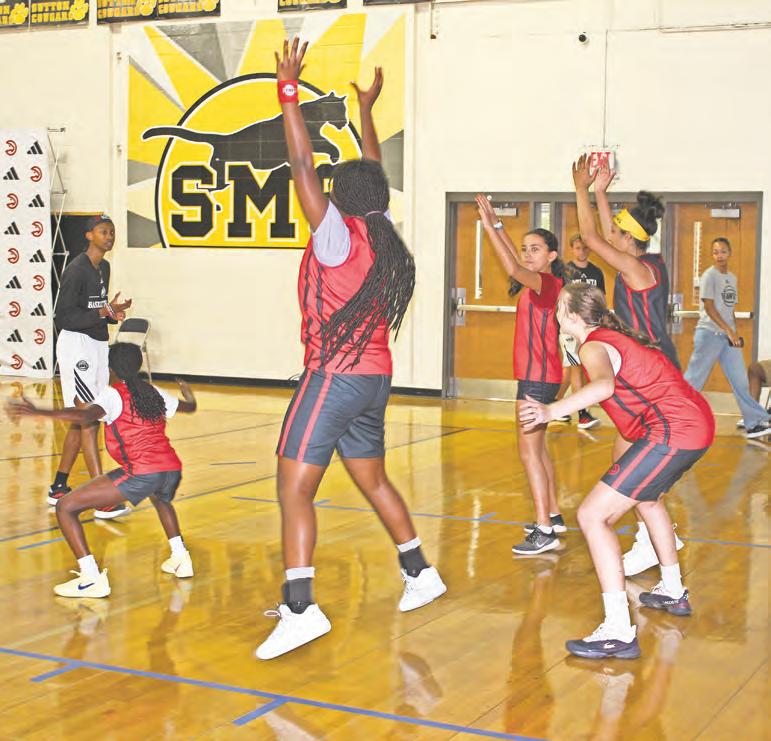
summertime. Jon Babul, Atlanta Hawks vice president of community impact and basketball programs, said the program has helped over 2,000 young girls.
“In the metro Atlanta area, most of the camps are boys only or co-ed, and for a young girl to walk in, 90 boys and 10 girls, that can be intimidating. So, our focus is on providing an environment where the girls can thrive, feel empowered, and make new friends. But more importantly, they get the confidence and esteem,” Babul said. “The continuation of that year after year and to see these girls grow from the time they’re eight years old to now — some of our girls are even seniors in high school — is really rewarding for us.”
The event also featured a leadership panel titled “Girls in STEM: Why We Belong Here.” It featured Naomi Davis, Google digital strategy specialist; Janice Koon, Hawks and College Park Skyhawks senior vice president of NBA G League and 2K Operations; and Brittany Simone, Google program manager of integrated planning transformation. They discussed being women in male-dominated fields, cool projects they’ve worked on, the importance of teamwork, and how they were encouraged to pursue STEM fields.
“The Atlanta Hawks and the College Park Skyhawks really invest in being true to Atlanta. And with that comes the next generation of female athletes and students,” Babul said.
By LIZ COURQUET-LESAULNIER Word In Black
Between Elon Musk’s xAI chatbot Grok spewing far-right rhetoric and referring to itself as “MechaHitler,” a scammer using AI to impersonate Secretary of State Marco Rubio, and a UCLA grad popping open his laptop during commencement to show how he used ChatGPT to complete his finals, artificial intelligence is having a summer full of drama.
That’s not good news for the nation’s educators.
AI tools are rapidly proliferating in schools without clear policies or training for anyone. A recent survey found that 97% of high school and college students say they’ve used AI to complete coursework. So many college-bound seniors use AI to write their admissions essays that colleges are considering eliminating them altogether.
Now, the American Federation of Teachers — the nation’s second-largest teachers union — has entered the AI chat. On July 8, AFT announced a partnership with tech giants Microsoft, OpenAI, and Anthropic to launch the National Academy for A.I. Instruction, a $23 million initiative that “will provide access to free A.I. training and curriculum for all 1.8 million members of the AFT, starting with K-12 educators,” according to a release.
The goal: “transform how artificial intelligence is taught and integrated into classrooms across the United States.” But the announcement poured gasoline on the fiery debate about AI, educational equity, and the fundamental nature of teaching and learning.
Critics on social media lashed out at AFT President Randi Weingarten, accusing her of ignoring the threat AI poses to education in general — and teaching in particular.
Continued from page 2
has long affected the community.
The history of Summerhill goes back more than a century, but in recent years, the neighborhood has experienced dramatic changes in cost of living, financial access and available living amenities.
“There was nothing here at first — this community was once a banking desert,” said Mathilda Lambert, vice president of community and business development at JPMorgan Chase. The bank was one of the first major financial institutions to establish a presence in the area.
“It’s something unique, because while there are a lot of
“Grok just advocated for the holocaust but now the AFT president wants educators to go forward with AI,” wrote one critic. Others pointed to a Massachusetts Institute of Technology study released in June that found students who use ChatGPT to write essays for them have weaker cognitive engagement. Still others noted Bill Gates envisions a future where AI can “be as good a tutor as any human ever could.”
Dr. José Vilson, a New America fellow focused on the intersection of AI and teacher work, who is executive director of EduColor and a professor at Teachers College, Columbia University, tells Word In Black that when AI evangelists just straight up “talk about how great this technology is,” and that it could replace real humans, “you should be highly skeptical.”
Brad Smith, Microsoft’s president and vice chair, emphasized the partnership will give teachers opportunities to “tell tech companies how we can create AI that better serves kids.”
But Evan Gorelick, who writes for The New York Times, warned that Big Tech is taking advantage of stressed-out teachers and students.
He wrote that AI companies are promising to ease teachers’ workloads and prepare students for the workforce. Meanwhile, students get “discounted (chatbot) subscription rates around exam periods. It’s an old playbook: Get kids hooked, and you’ve got future customers.”
Advocates promote AI learning tools as a game-changer: with virtual teachers and tutors, we can kiss goodbye the problem of Black kids who can’t read on grade level. But Vilson, however, knows the real-world
solutions that actually get results: the hard work of lifting kids out of poverty and integrating schools.
“We have a thing that worked, which is making sure that people had shared power in the form of integration,” Vilson says. “That was probably the closest we ever got to actually closing the so-called achievement gap.”
Decades of studies show Black students from underserved communities are more likely to be deprived of what white students in well-off schools benefit from: small class sizes, well-trained teachers, schools with resources, and access to rich educational experiences.
In other words, students at elite college preparatory schools like Boston Latin School or New York City’s Horace Mann School probably won’t be propped in front of an AI chatbot to learn. Nor are they likely to breathe air polluted by AI data centers and server farms in their neighborhood — a scenario, Vilson warns, could be replicated in other communities.
and De-skilling
A recent joint Walton Family Foundation/ Gallup survey found that 6 in 10 teachershave used AI to help them do their jobs. “If that’s true,” Vilson says, “then what does that say about the things that we’re pushing educators to do on a general basis that are unrelated to the actual core work of teaching and learning?”
Education activist Jesse Hagopian recently asked why, “in the wealthiest country in the history of the world, are class sizes so large — and resources so scarce — that teachers are forced to rely on AI instead of instructional assistants? Why aren’t we hiring more librarians to curate leveled texts or reducing class sizes so teachers can tailor learning themselves?”
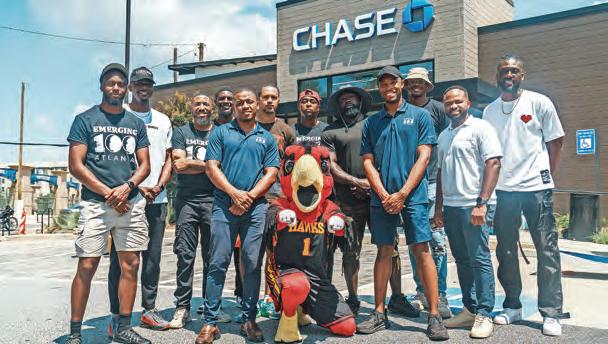
back-to-school events, when you combine school supplies with financial literacy, you’re able to bless people on both ends,” said Daniel Farr, president of The Emerging 100 of Atlanta.
“When you see the wealth gap widening in this country — and in
our community — it’s incredibly important that we are discussing finance,” Farr added.
The percentage of Black and Hispanic households that are credit invisible is 3% higher than that of white households, according to recent data from the
Most large language model AI tools we use aren’t independently intelligent — they copy from books, websites, and Reddit threads fed into them without permission. Like Grok, they then mimic racism in the information they provide — or withhold.
Hagopian detailed how a World War II classroom module created by Khanmigo, Khan Academy’s AI chatbot, “doesn’t prompt students to wrestle with the fact that Hitler openly praised the United States for its Jim Crow segregation laws, eugenics programs, and its genocide against Native Americans.”
To the AFT’s credit, Vilson says, being informed in the AI debate is “better than the alternative, which is that technologies keep running roughshod over what we call the teaching and learning process.”
In a statement on the National Academy of AI Instruction partnership with Big Tech, Weingarten said AI can’t replace the teacher-student connection. But “if we learn how to harness it, set commonsense guardrails and put teachers in the driver’s seat,” she says, “teaching and learning can be enhanced.” The American Federation of Teachers did not respond to Word In Black’s request for comment.
Vilson says teaching and learning are about things AI can’t replicate: trust, relationships, cultural competency, and community.
It is “soul work, that heart work,” he says. It’s why we need more teachers who reflect students’ identities, he says, who know learning is more than standardized test prep.
“If we leave some of these pieces to a technology that’s outside of our being, then are we actually teaching? Are we actually learning?” he asks. The answer is “something that we all need to struggle with a bit.”
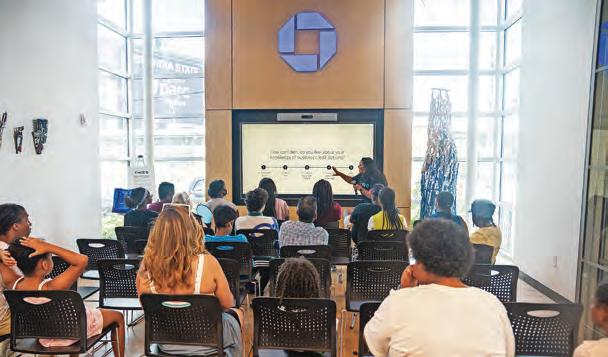
Consumer Financial Protection Bureau.
Lambert, who was born and raised in Atlanta, said events like this are meant to start the conversation about finances early on and to reassure the community that the Summerhill branch is a place
where they are welcome to connect and ask questions anytime. Saturday’s event is just one of many financial literacy and community outreach initiatives JPMorgan Chase plans to host across metro Atlanta this year, according to Lambert.
By NOAH WASHINGTON
Miya Bailey, 50, has operated in Atlanta’s Castleberry Hill neighborhood for nearly two decades, and is fighting a city shutdown order that he says stems from a misunderstanding about a 2008 ordinance designed to protect his establishment.
On April 16, the City of Ink Tattoos received a stop-work order from city ordinance enforcement, forcing Bailey to close the tattoo studio, which has served as the financial engine for multiple art galleries and community projects in the historically industrial neighborhood.
“City of Ink is originally an art gallery that happened to have a tattoo studio inside of it,” Bailey said. “We use that money from tattooing to fund a community center, to fund our curated art galleries.”
The shutdown stems from a 2008 ordinance that Bailey says he helped create with then-Councilman Kwanza Hall to prevent additional tattoo shops from opening in Castleberry Hill. The ordinance was intended to protect Bailey’s business from competition, but current code enforcement officers apparently misunderstood its purpose.
“The code enforcer didn’t know how long we’ve been here or what we were doing,” Bailey said. “Atlanta hires code enforcement officers who aren’t familiar with their communities.”
Bailey opened City of Ink in 2007 when Castleberry Hill was largely abandoned, with only Off the Hook Barber Shop and a now-closed pizza restaurant as neighbors. The tattoo studio funded multiple ventures, including Peter Street Station, Nina Baldwin Gallery, Old Rabbit Gallery, and various community art projects.
The business employed about nine artists before the shutdown. Bailey continues paying rent, utilities, and insurance on the closed location while operating his galleries to stay afloat.
“Everything is self-funded by selling art and making tattoos,” Bailey said.
The closure is part of what Bailey describes as a broader pattern of aggressive code enforcement targeting small businesses across Atlanta. He has been in court for nearly a year on various citations, including violations for changing promotional vinyl on windows and other minor infractions.
During court appearances, Bailey said he witnessed elderly residents receiving citations for minor violations, including a 91-year-old woman cited for tall grass and an 80-year-old man cited for working on his car
in his yard.
“A system without empathy is not for the people,” Bailey said, criticizing what he sees as overly aggressive enforcement that lacks understanding of community needs and cultural practices.
“It just feels like gentrification is happening,” Bailey said, suggesting the pressure may be related to the 2026 World Cup, with Mercedes-Benz Stadium located nearby.
Bailey cites support from current City Councilman Jason Dozier, former Councilman Kwanza Hall, the neighborhood planning unit, and the Castleberry Hill community. He adds that the mayor’s office has indicated it will try to help resolve what officials called “a mix-up in paperwork.”
Plushette Ellis, chief operating officer for the Walkers and Peters project, praised Bailey’s community impact.
“City of Ink isn’t just a business, it’s a cultural landmark in Castleberry Hill. It laid the foundation for the art and creative economy we see here today. “
Bailey will appear before the city’s zoning board on Thursday, July 17, at noon to appeal the shutdown order.
“I’m really asking Atlanta to come out and support, help out,” Bailey said. “When City of Ink reopens, we’ll have a big block party.”

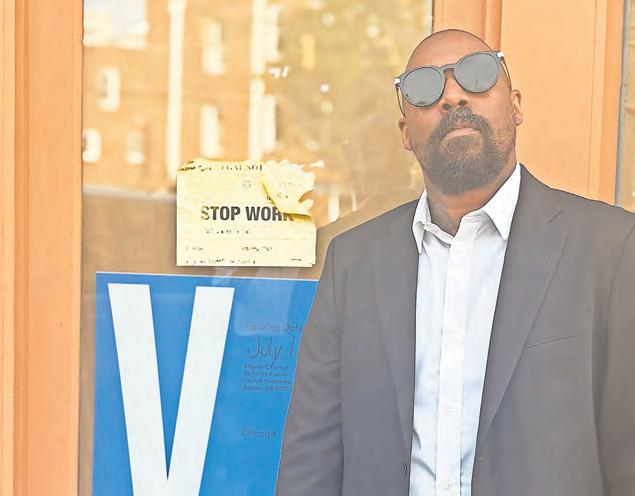
On April 16, the City of Ink Tattoos and owner of the business, Mya Bailey, received a stopwork order from city ordinance enforcement, forcing Bailey to close the
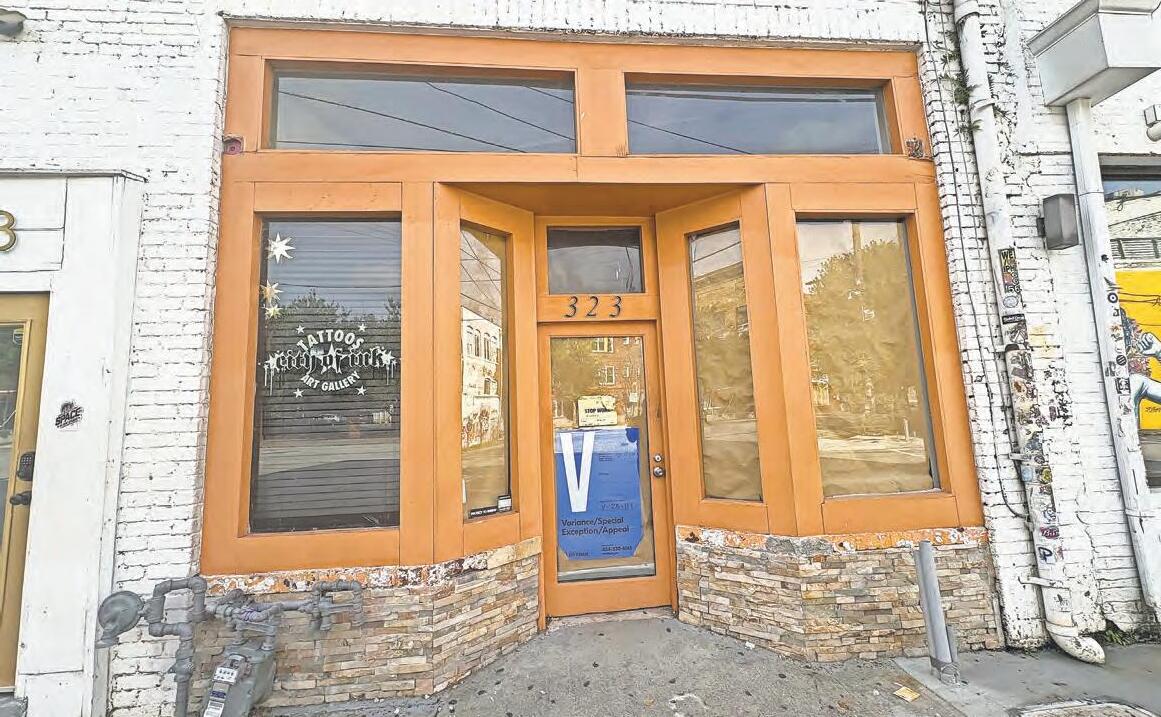
By TABIUS McCOy Report for America Corp
Atlanta Mayor Andre Dickens, city housing developers, and longtime community residents gathered Tuesday morning in the Atlanta summer heat for the groundbreaking ceremony of a new affordable housing complex being built in the Sylvan Hills neighborhood.
The 233-unit complex is the second phase of redevelopment for the community, following its construction of senior living apartments that were built in the neighborhood in 2022.
“Affordable housing is my love language,” said Dickens during the groundbreaking ceremony. One of his main motives when entering office in 2022 was to have 20,000 affordable housing units built in the city by 2030.
“So far, we are about three and a half years in, and we have 6,800 units completed and 5,000 more units already under construction or funded,” said Dickens.
In recent years, like many other neighborhoods in Atlanta, Sylvan Hills has been a target and victim of gentrification and demographic shift. From 2010 to 2020, the city of Atlanta noticed a 7.1% decline in the Black population, according to census data.
“Some of my concern about gentrification is how it’s pushing residents out of the city, so this development is important because we have to ensure legacy residents have a place to live that’s affordable,” said Sharon Guest, the founder of Radiant Development Partners, one of the development companies that helped with the project.
Guest is an Atlanta native herself, born and raised in the Ben Hill community and a graduate of Atlanta Public Schools, so this development was really special to her because this is her city and her people, she said.
Residents Mary Moss and Robin Stanley of the Sylvan Hills Senior Apartments have both been living in Atlanta for over six decades
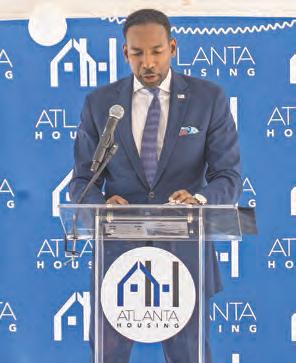
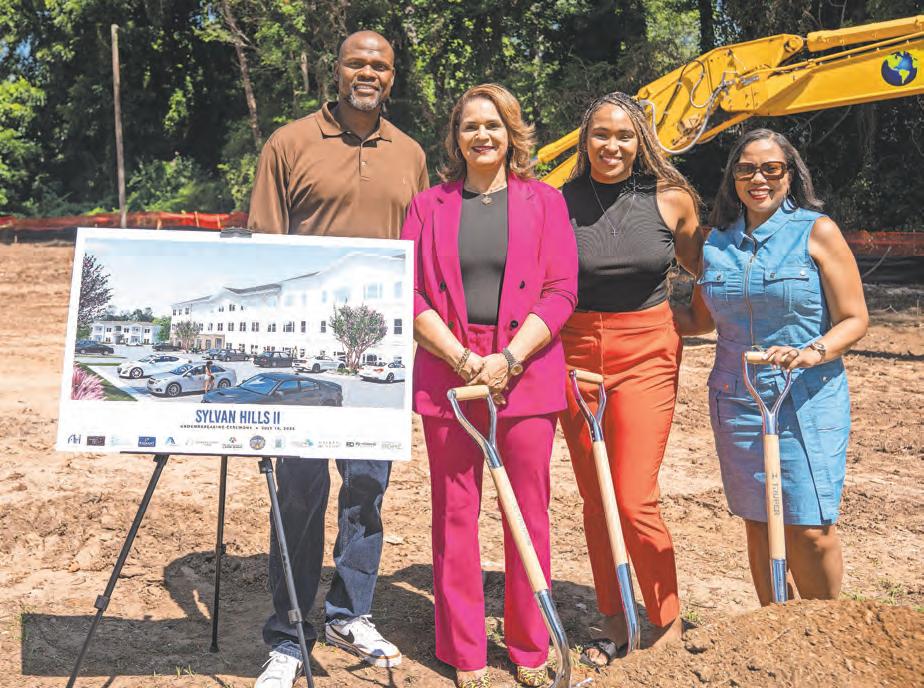
a good thing for the area, but they hope it will open up opportunities to have more living amenities around the area, such as healthy food options.
and have watched the city change year by year. They both said that this new development sounds like
This project cost $52.7 million and was publicly and privately funded by eight different sources. According to Atlanta Housing, one
of the developers on the project, the new development will appeal to households of various incomes.
• 24 units for residents earning at or below 50% of the area median income (AMI)
• 93 units for residents below 60% of the AMI
• 116 units for residents below
80% of the AMI
The 20-month project is expected to be available for rent in late 2026, with units ranging from one-bedroom to three-bedroom.
According to Atlanta Housing, this is one of many affordable housing developments currently in the works.
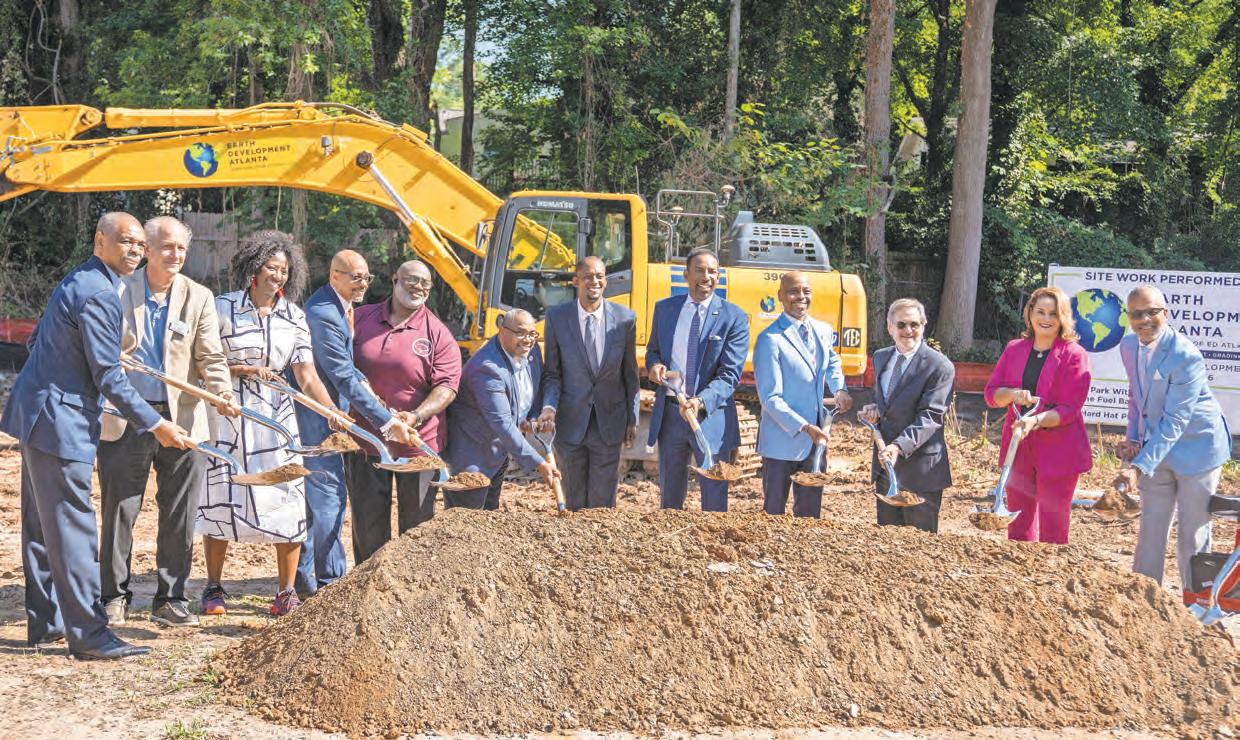
By DyANA BAGBy
In 2002, Freda Jones owned a successful hair salon, drove her dream Cadillac, and was the proud mother of four children. She was living the life she had imagined as a little girl growing up on Atlanta’s Westside.
“I was 32 and had accomplished everything that I wanted,” she said. “I had survived the tough neighborhood.”
That June, her long-term partner caught pneumonia. Jones said she felt her spirit telling her to get an HIV test. Two weeks later, she received her HIV diagnosis from a nurse at Grady Hospital. The life she worked so hard for was over, she remembered thinking.
“I thought, ‘Oh, my god. I’m going to die. Who is going to take care of my kids?’” said Jones, now 56. “I thought I was grown because I was a mom and was making money, but now I say I didn’t grow up until I found out my diagnosis.”
Jones started treatment at the Fulton County Health Department, where she attended support groups for people living with HIV. She also started volunteering at the health department. She found a new purpose as an HIV educator.
But Jones saw a significant lack of representation of Black, healthy cisgender women like herself in community support groups. So she founded LOTUS in 2018. https://lotusempowerment.org/ Named after the flower that rises from muddy waters, the private, peerled support group symbolizes women’s resilience and transformation, she said.
Today, LOTUS boasts over 300 members in Atlanta and Georgia and across the country. The group meets twice a month via Zoom and also hosts social gatherings from Easter egg hunts to Christmas parties.
Through photo shoots and community presentations, LOTUS provides a safe space for women to “share experiences, challenges,


and triumphs while building community and resilience,” Jones said.
“Our mission is to develop women to reach their full potential through support and advocacy by empowering them,” she said. “When women see others thriving and surviving, they hold their heads higher.”
In 2021, the 20-county metro Atlanta area had the third-highest rate of new HIV diagnoses among U.S. metro areas, with 74% of that number among Black people. One in two Black men in metro Atlanta — 50% — is at risk for HIV, said Jeff Cheek, director of the Fulton County Department of HIV Elimination.
The slashing of federal funding for HIV prevention and research by President

Donald Trump is only going to lead to worse numbers and a steeper climb in HIV rates in Atlanta, he predicted. He said this could be a return to the onset of the epidemic, when it was the community — not organizations — that formed support networks and fought for treatment.
“I think during this time of turmoil, facing funding cuts for HIV and specifically on the prevention side, calls the community back to the early days of the epidemic, in the 1980s, when we fought for funding, and we’re going to do it again,” Cheek said.
“These groups were started by people in the community because they were not getting any help anywhere else, and so individuals with HIV were starting these peer support groups,” Cheek said.
Leisha McKinley-Beach, founder of the Black Public Health Academy and a longtime HIV activist, has witnessed the evolution of these groups.
“Peer support groups have to retool to remain relevant in how they support people living with HIV in this current day and time,” she said, pointing to virtual groups like LOTUS as innovative models that expand access.
Numerous studies show peer support and community-led support networks can be effective in reducing stigma for people living with HIV and also improving treatment adherence, but more research is needed.
A 2024 study, “Ending the HIV Epidemic in Metropolitan Atlanta,” has many suggestions, but ended with a stern message: “Given the lasting effects of segregation and persistent structural racism, community empowerment must form the foundation of the Atlanta HIV/AIDS response.”
Dr. Daniel Driffin is co-founder of THRIVE Support Services (SS) that provides resources
Dr. Daniel said peer and community-led support groups can ‘bridge critical gaps in HIV care, especially for Black and brown men who are disproportionately affected by HIV.
for Black gay men living with HIV. He is also an organizer of the new planning coalition seeking community input on ways to end the HIV epidemic.
Peer support groups “bridge critical gaps in HIV care,” he said.
“Black and brown people still are unequally impacted by HIV. We see roughly two out of three new diagnoses are amongst Black and brown people,” he said. “Peer networks can stand in the gap... especially since the majority of people providing care for people living with HIV are north of I-20.”
These support groups also provide resources when it comes to medication and slowing transmission.
“Networks assist in the process of making laboratory results make sense,” Driffin said. “More times than not, you may get 15 minutes with your medical provider, and you think of all the questions once your provider walks out. Having a network of people living with HIV that you’re connected to, you can drop those types of questions into the network.”
Cody Henry, program manager at THRIVE SS, when people with shared experiences come together, they not only find comfort but also find a foundation.
“When our community is educated about HIV status, the importance of testing, understanding medication, recognizing that undetectable equals untransmittable... those are conversations that are present during peer support groups,” Henry said.
“The peer support group offers a great mechanism to lower transmission rates.”
By ISAIAH SINGLETON
Black men’s mental health is a complex and often overlooked issue. justUs MH Foundation, a platform dedicated to fostering mental health awareness and providing support to black men hosted their 3rd annual Black Men’s Mental Health Conference at the Russell Innovation Center for Entrepreneurs in Atlanta.
According to the National Centers for Disease Control and Prevention, approximately 1 in 4 women (23.2%) and 1 in 7 men (13.9%) have experienced severe physical violence by an intimate partner in their lifetime.
Additionally, evidence shows that state that relational violence and children who are affected, either directly or indirectly, are at a significantly higher risk of developing mental health conditions. Anxiety, PTSD, depressive disorders, and other mental health conditions are factors that are plaguing our communities at a high rate.
This transformative event brings together a dynamic panel of speakers, including Dr. Myrone Fountaine (aka “The Prison Dr.”) as the keynote, alongside mental health professionals, thought leaders, and community advocates dedicated to empowering and uplifting Black men through open dialogue, healing, and practical resources.
Guests gained access to expert insights, mental wellness tools, and community support in a culturally affirming space.
The Black Men’s Mental Health Conference was created to bring awareness to the current state of mental health within the African American community with a specifically targeted focus on black men.
The goal of the Black Men’s Mental Health Conference is to shine a light on mental health in the black community while providing a safe space for black men to seek information, voice their experiences, and come together in fellowship, unity, and love.
Statistical and clinical diagnoses show that the black man’s mental health is more complex and delicate than other nationalities.
Due to structural racism and Black men’s unique history in this country, their mental health and treatment are intimately tied to factors such as implicit bias on the part of medical providers, extreme poverty rates, and low access to quality psychological and psychiatric services. Compared to other races, black people are less likely to receive guidelines and consistent care or even be included in mental health

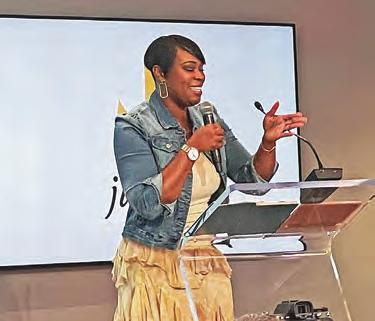
research.
Camillia Harris, founder of justUs, MH Foundation has crafted a strategic approach to bring awareness to mental health issues that lie dormant and go unrecognized.
After losing her father to suicide in 2019, she is determined to remove the band-aids of trauma, pain, and unmet mental health needs.
“We must have discussions around intervention and preventative measures (THAT WORK). We must ignite trust back into our communities, within our physicians, and in our very own households. We must hold each other accountable for helping someone in need. We can’t look the other way anymore,” she said.
Keynote speaker “The Prison Doctor” reflected on his 20 years of incarceration and the stark contrast between his privileged upbringing in Chicago and the societal decline he saw upon release.
“I came home to a world where fathers were not in a home,” he said. “Back in my day, if you went to a neighbor’s home, it was easy for it to be a man to open the door, but nowadays, the average door in your neighborhood will be opened by a woman and there’s no father around.”
He also said he came home to a world where people were smoking weed, vapes, and selling drugs, and even drug the music industry in the conversation.
“The music is deplorable, degrading women, and it’s despicable. I come from an era where people call themselves the Miracles and the Supremes,” he said.
He also criticized modern culture particularly in media and social norms highlighting the objectification of woman and the negative portrayal of men.
During the panel discussion, Amari Morton - owner of Greater Change, Corey Baker –Founder of Skillsets for Life Consulting LLC, Omar Ali – Global and Domestic Company President, and Psychologist Dr. Curtis Jasper all gave advice to other Black men that it’s okay to ask for help.
Baker said his advice on mental health for black men is to find a safe space to be able to unpack.
“We hold in a lot of things mentally that we may go through in life, whether it’s work, home, or private life, and just in society,” he said. “Find a community of people, or person, that you can speak with that are wise, and that’s not going to push you the wrong way but help you move in a positive direction.”
Ali says he finds it necessary to remind young black boys that it’s not their responsibility to carry it all alone.
“We’re not damaged in isolation, so we can’t heal in isolation. We must heal in community,” he said. “This whole notion of young black boys carrying the weight of the world has this indirect reflection to the senior men around it, it’s not yours to carry all by yourself.”
He also says there are three things Black males struggle with regardless of age: Trauma, which is stored in the body and expressed through the mind, Betrayal, and Sadness.
“For many young boys, it starts at an incredibly early age and sometimes it is traumatic that causes sadness, and they hold onto it by thinking they are all alone. Black males experience trauma thinking and feeling they are all alone,”
he said.
Ali said the greater demand on the money when the body is struggling emotion.
“I find teaching black males how to become emotionally literate will reduce a number of things that are missed expressed through the mind as a result of the average black man just don’t like feeling bad,” he said.
Jasper said his advice will go back to business saying to not start off with profits.
“It’s going to drive you ragged and you’re going to lose your mind only chasing profits. Chase purpose instead, profits come from purpose within your business. Create purpose within your family and within your community,” he said
Morton says to take what they spoke on about mental health during the panel and teach it to someone else.
“When we teach people things, we have to better understand those things ourselves, and today, this conversation being about mental health and how to better understand it in Black spaces, is important to take back into your communities,” he said.
“We do need you in our households’ Black men and we need to have a representation of fatherhood in our communities again,” Harris said.
With the loss of her father, she learned black men don’t know who to trust.
“How do we get back to those places and spaces where being open and honest isn’t weaponized or shared with outside sources,” she asked.
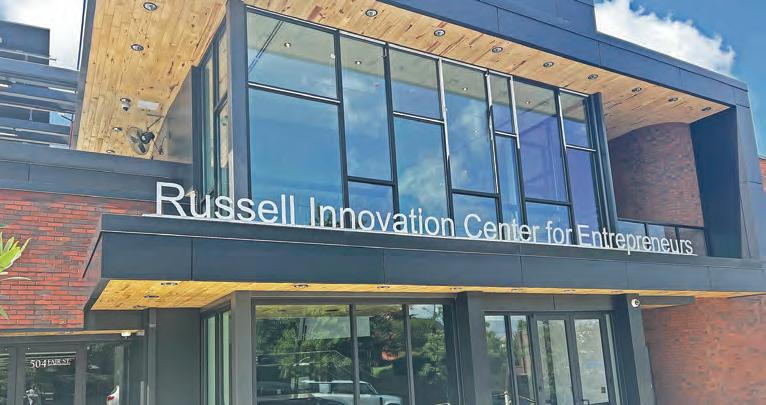
By DONNELL SUGGS
SAVANNAH, GA — Georgia Senator Jon Ossoff held another “Rally for the Republic” on Saturday afternoon in Chatham County, one of the state’s most educated, upper-middle-class, working-class, and voter-populated counties.
Ossoff took the stage inside the Kehoe Iron Works just after 3:15 p.m. to a loud round of applause from just over 1,000 people in attendance. With more than a year and a half till voters cast their votes for his Senate seat, Ossoff was in Savannah to speak to supporters and voters about the current Presidential Administration’s legislative actions.
“You can’t claim you’re for working-class men and women when you do these things to cut taxes for the richest people in the country,” Ossoff said. “When you’ve got a government like this, it always comes with corruption.”
Ossoff spent his time on stage pointing out what he called the cowardice of Georgians in the United States Congress. The $4 trillion added to the National debt was used as an example.
“I don’t want to hear another Republican member of Congress ever pretend to care about American debt,” Ossoff said.
Phyllis and John Bush, Savannah residents and engaged voters, sat quietly while Ossoff campaign staffers and volunteers moved around the warehouse space at Kehoe Iron Works, preparing for the rally. The Bushes wanted to get a good seat for the rally where they could see and hear the senator speak.
“I voted for him last time, I will vote for him again,” Phyllis said. “But I want to get more indepth with what he has planned next.”
Her husband agreed that he was there for the same reasons, but added, “I want to get information on Trump’s big bill and what the Democrats plan to do about it,” John said. “There’s something we can do about it. We’re not powerless.”
The sentiment around the venue filling up quickly hours before the scheduled 3 p.m. start time was the same: What’s the plan?
“I supported him the last time he was down here with (then) Vice President Kamala Harris, and I just want to hear his message,” Ernest Roberts, a Savannah resident, said. Roberts, sitting with his wife Yvonne, said they are politically active and enjoy attending rallies to be as informed as possible. With more than 16 months until Election Day, November 6, 2026, Democratic Party volunteer Karen Beasley says it can never be too late to engage voters. While the DJ inside Kehoe Iron Works played a medley of dance tunes, including the “Cupid Shuffle” and “Cha-Cha Slide”, Beasley’s voice was barely audible.
“We need to sustain this energy and ongoing action for the next 16 months,” Beasley, a
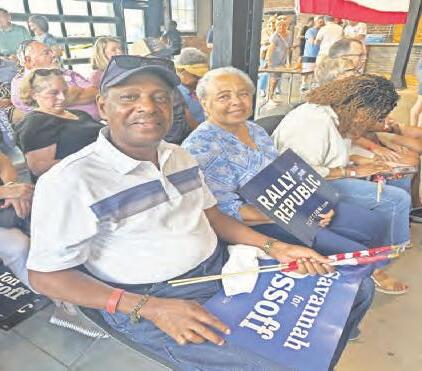

Savannah resident, said. “For one thing, fundraising is going to be crucial.”
Beasley was referencing the fact that Georgia State Representative Buddy Carter, Ossoff’s most serious opponent for his Senate seat, has raised more than $1 million for his senatorial campaign.
Jerome Irwin, the president of Building Futures, Inc., a local youth-focused skills training program, said he plans to hold Ossoff accountable, whatever his plan is.
“I expect to hear what his plans are and to see if he will stand true to those plans,” Irwin said. “We’ll hold him accountable no matter what.”
Some of the speakers on the rally’s agenda were a local OB-GYN, Dr. AYANA Graham, community organizer Amanada Hollowell, and Trey Murray, the president of construction at Sunpath Solar, a Dallas, Georgia-based energy manufacturing company.
Murray said Sunpath Solar employs 20 Georgians and has installed solar panels on residential and commercial properties in Savannah. Energy affordability was the reason he was at the rally.
“We need leadership that ensures solar remains a viable option for Georgia families,” Murray said.
Hollowell, a mother and caretaker for her father, a retired United States veteran, said the cuts to programs that help her take care of her father are in danger. Medicaid cuts and insurance cuts were at the top of her list of speaking topics.
“This budget will hurt all Georgians. As a full-time caretaker and mom, I worry deeply,” Hollowell, who shared stories of parents and veterans worrying about household budgets, said. “It’s going to require all of us to speak out and effect change. We need to make sure we send Senator Ossoff back.”

By STACy M. BROWN
Areport from the Employee Benefit Research Institute shows that Black Americans continue to face serious challenges in saving for retirement, even as their incomes grow.
The 2025 Retirement Confidence Survey, which included a special oversample of Black workers and retirees, found that the wealth gap remains wide at every income level. Among households earning $75,000 or more, only 33% of Black Americans reported having $250,000 or more in savings and investments, compared with 63% of non-Black Americans.
Debt remains a major obstacle. Sixty-three percent of higher-income Black households said debt is a problem, while only 45% of nonBlack households at the same income level said the same. Nearly half of upper-income Black respondents said debt affects their ability to save or live comfortably in retirement.
While many Black Americans expressed confidence in managing day-to-day budgets, fewer felt prepared to invest or plan for the long term.
The study showed that Black Americans with higher incomes were less likely to have personally saved for retirement — 77%, compared to 87% of non-Black Americans.
Retirement experiences also differed sharply. Forty-four percent of Black retirees said they retired earlier than planned because of a health problem or disability, compared with 32% of non-Black retirees. After leaving their main jobs, Black retirees were more likely to work for pay to make ends meet and more often said their retirement lifestyle was worse than expected.
Access to financial advice and planning remains uneven. Just 31% of Black respondents reported currently working with a financial adviser, although nearly half expect to do so in the future. Black Americans were more likely to seek help with reducing debt, creating wills or estate plans, and arranging life insurance, rather than simply determining if they had saved enough to retire.
Black workers also expressed high interest in innovative retirement products. According to the report, 85% of Black employees with workplace savings plans stated that they were somewhat or very interested in using some or all of their retirement savings to purchase a product that guarantees a monthly income for life. Seventy percent said they would buy an insurance product that begins providing guaranteed income at a later age, such as 80 or 85, a higher percentage than the 59% of non-Black workers

who expressed the same sentiment.
When asked about converting workplace savings into monthly retirement income, Black Americans were more likely to find each of the options appealing. For example, 75% favored a default investment option that includes guaranteed lifetime income features, while 73% liked the idea of an employer-selected platform to help them choose income solutions.
The survey also showed differences in expected sources of income during retirement.
Nearly 9 in 10 Black workers and retirees said they expect to rely on Social Security. However, Black retirees were more likely to depend on financial support from family or friends and on disability insurance income, while non-Black retirees were more likely to rely on personal investments and workplace savings plans.
Participation in workplace retirement plans is increasing, but it remains uneven. Among Black workers earning less than $35,000, 41% reported being offered a workplace retirement plan. That figure rose to 86% for higher-income workers. Across all income levels, approximately 9 in 10 workers who were offered a plan reported being satisfied overall. Satisfaction levels were similar between Black and non-Black workers when they were asked about plan features, investment choices, tools for calculating
retirement needs, and fees.
The report highlighted a strong appetite for new plan features that could help address financial vulnerabilities. Eighty-eight percent of Black workers said they would likely use an emergency savings account funded through payroll deductions, compared with 68% of nonBlack workers. Black workers also showed more interest in features that would allow student loan payments to qualify for employer matching contributions to retirement plans.
Researchers Craig Copeland and Lisa Greenwald wrote, “Black Americans reported disproportionately lower financial resources, and how they feel about retirement and financial security is clearly impacted by having less resources.” They said, Black retirees, in particular, are “struggling with higher likelihoods of their retirement lifestyle being worse than expected” and “having to retire earlier than planned because of a health problem or disability.”
However, the researchers concluded that there is hope.
“There are some modifications in the financial system that could help improve their prospects,” they said, “such as increased assistance in balancing competing financial priorities like debt reduction, supporting family, and building long-term savings.”

By LAURA NWOGU
“Can you hear me?” Beyoncé sang during the opening notes of “Ameriican Requiem.” “Do you feel me?”
The ensuing yells from the crowd at Mercedes-Benz Stadium Thursday night illustrated just why Beyoncé’s tours are primed for stadiums; they bring an energy that can hardly be contained. Thursday’s performance kicked off the global superstar’s first night of her Cowboy Carter tour four-day stop in Atlanta. It’s been two years since the city was graced with her presence where liberation, self-love, and renaissance ringed true amid a flurry of sparkles and futuristic aesthetics.
Now Beyoncé has ventured more deeply into her country music roots — a journey that finally brought her the coveted Album of the Year at the 2025 Grammys — and has slipped firmly into the role of a genre-bending artist.
The stadium was filled with cowboy hats galore, boots to the ground, and ever-present folding fans as the crowd danced, shimmied, and sashayed to hits from Beyonce’s “Cowboy Carter” album. For nearly three hours, the singer-songwriter took her fans through an impressive setlist of 40 songs and 10 acts,
from her latest album to hits from her previous eight studio albums.
It was a nonstop blitz of music, inventive interpolations and mixes, choreography (and hairography), seamless production, and storytelling made more poignant by visuals and historical archives.
The visuals celebrated Black history and its contributions to American culture while also highlighting how African Americans have carried the country music genre far beyond 2024. The night’s theme was reclamation, and while the sentiments of belonging and patriotism may reverberate discordantly with some, considering the climate of America today, they challenge what the American dream is supposed to look like.
With each tour, fans get more of a glimpse behind the curtain of Beyoncé’s personal life. However, this time, those glimpses are front and center on stage. Blue Ivy and Rumi, Beyonce’s daughters, were highlights of the night. “Manager” Blue Ivy showed off her dancing chops in multiple dancing numbers, which have been going viral on social media, and Rumi joined Beyonce for a performance of “Protector,” her bubbly grin and childlike excitement on display.

And it may have been the Cowboy Carter tour, but Beyoncé made sure to show love to her other eras. “Welcome back to the Renaissance,” she declared before singing a medley of songs from the Act I album. She also performed a segment where she sang throwback hits from “Lemonade,” “B’Day,” “Beyoncé,” and “I Am… Sasha Fierce.”
Bits and pieces of her other ventures, whiskey brand SirDavis and haircare line Cécred, were scattered throughout the show, showing just how much her reach extends beyond music. In celebration of the tour, many spots in Atlanta hosted Cowboy Carter-themed events with specialty drinks. For those looking for a few places, the Marriott
Marquis, Pasha, Nouveau Bar and Grill –Jonesboro, and the W Hotel Downtown invite fans to sip on SirDavis before they saddle up for the concert.
The night ended with Beyoncé soaring through the crowd on a golden horse suspended in the air while singing the penultimate song on her setlist, “16 Carriages,” a new change after experiencing a malfunction with her usual red Cadillac during a tour stop in Houston.
It was a show that encompassed just how genre-bending Beyoncé can be. Like she rapped on the song “Spaghetti:” “I ain’t no regular singer, now come get everything you came for.” And Atlanta did just that.

By DONNELL SUGGS
When the National League starters were announced and it was time for Atlanta Braves right-fielder Ronald Acuna, Jr. to take his place amongst the best players in baseball, the volume of the cheers inside Truist Park could be heard from Cobb County to Summer Hill. Acuna, Jr. had an infield single in his first at-bat, batting second behind Los Angeles Dodgers star Shohei Ohtani, who singled to lead off the game. He would score on a double by Arizona Diamondback Ketel Marte.
Acuna, Jr. struck out during his second at-bat to start the third inning.
Chicago Cubs centerfielder Pete Crow-Armstrong doubled in his first at-bat. The first-time all-star is in his second year in the Majors and is receiving National League MVP hype. Pittsburgh Pirates twotime all-star Paul Skenes, the National League starter, struck out two of the three hitters he faced in his only inning of work.
Seattle Mariners catcher Cal Raleigh continued his strong All-Star Week. A day after winning the Home Run Derby, Raleigh singled in his first at-bat in the All-Star Game. Minnesota Twins pitcher Joe Ryan came in the fourth inning for the American League and struck out San Diego Padres star Manny Machado and Chicago Cubs outfielder Kyle Tucker during a one-two-three inning.
Following a tribute to the late Hall of Fame Atlanta Braves star Hank Aaron, Braves first baseman Matt Olson came into the game in the seventh inning.
Pulled from the game after four innings and two at-bats (1-2, with a run), Acuna, Jr. addressed the media outside of the National League clubhouse in the bowels of Truist Park. Wearing a black vest without a shirt underneath, his platinum jewelry sparkled and matched the pin on his left pocket. The Braves star looked the part. All of the All-Stars looked the part in their own right tonight.
HBCU ball players got the 2025 MLB All-Star Week Started
The HBCU Swingman Classic kicked things off on Friday, July 11. HBCU sports fans from all over the South walked around The Battery, enjoyed food and drinks before taking their seats inside Truist Park for the annual HBCU baseball all-star game.
Sponsored by Major League
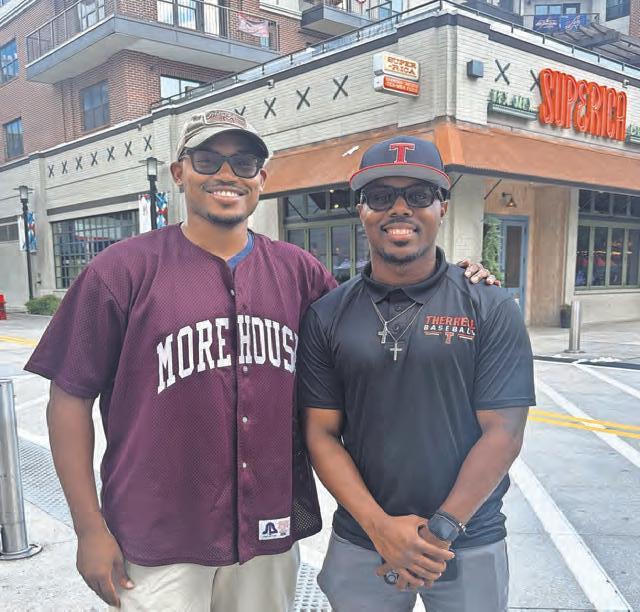

Baseball, the HBCU Swingman Classic is named after baseball Hall of Famer Ken Griffey Jr. and brings the best HBCU baseball talent to the site of the Midsummer Classic every year. With Atlanta being the host site of this year’s HBCU Swingman Classic, many HBCU alums were at Truist Park for the game. Compared to regular crowds at Truist Park for Atlanta Braves games, this Friday had an entirely different look, feel, and energy.
“This is unbelievable. HBCUs are taking over baseball,” said Morehouse College Athletic Director, former Morehouse basketball standout
and NBA guard Harold Ellis.
Former Morehouse College baseball player and Atlanta Public Schools employee Thomas Scott and his former teammate Ryan Christian, the head baseball coach and associate athletic director at Therrell High School, attended the game to soak up the baseball action and HBCU vibes.
“This is a fantastic way to highlight HBCU athletes, especially baseball players,” Scott said. “This is a long way from Perkerson Park.”
Scott proudly wore a Morehouse Maroon Tigers baseball jersey and
said, “This is game-worn.”
Atlanta Braves draft for need up the middle
The 2025 Major League Baseball Draft, which allows all of the 30 clubs to draft amateur players from high school and college ranks, took place at the Coca-Cola Roxy in The Battery on Sunday, July 13.
The Atlanta Braves wasted no time answering a need during the first two rounds of the MLB Draft.
With the 22nd overall selection, the Braves picked Tate Southisene, a shortstop out of Basic High School

in Henderson, Nevada. With the 60th overall selection in the second round, Atlanta picked Florida State University shortstop Alex Lodise. In the third round, with the 96th pick, the Braves selected another shortstop, Cody Miller. Miller played around the infield at East Tennessee State University, including at shortstop.
The Home Run Derby took place on Monday night, July 14, at Truist Park. Seven of the best power hitters in Major League Baseball put on a show for thousands of baseball fans as part of the All-Star weekend festivities.
The derby began with fireworks and Pat McAfee. Yes, that Pat McAfee. Major League Baseball broke out all of the stops on Monday night, including having McAfee announce the Home Run Derby participants like it was a WWE match.
Atlanta Braves first baseman Matt Olson, a three-time MLB All-Star and Atlanta native, was awarded the opportunity to hit last. The cheers from the crowd when his name was announced as the seventh participant were the loudest of the evening. Olson failed to advance into the semifinals, but had a couple of moments where his 15 home runs felt like it was going to be a lot more. Olson had a streak of five home runs between his ninth and 15th dingers that got the crowd going.
By DENNIS MALCOLM ByRON AKA ALE SHARPTON
In 2025, Acura steps it up with their extremely popular RDX regarding style, technology and interior upgrades. Maintaining its top position in the compact luxury SUV segment, my review version is the top-of-the-line A-Spec Advance edition, and even with all its enhancements, Acura still keeps the bank account happy at a very reasonable price tag.
The eyes get captivated with the highly recommended Urban Gray Pearl exterior—a new color—complemented with several new additions for 2025. The A-Spec trim enhances the RDX with exclusive 20-inch alloy wheels which come redesigned boasting 10-spoke wheels finished in “Shark Gray” highlights. Other standouts include the “frameless” diamond pentagon grille, futuristic Jewel Eye LED headlights and, of course, A-Spec badges to let onlookers know what level this vehicle is on. The look is welcomingly aggressive and sportier than past generations.
Under the hood, the RDX

flexes with a 272-horsepower 2.0-liter VTEC turbocharged engine, making its four-cylinder classification an afterthought, while averaging a decent 23 miles to the gallon. Regarding the driving experience, the peppy motor is paired with a smooth 10-speed automatic transmission and SH-AWD system Acura is consistently applauded. Overall, the powertrain delivers in
acceleration, maneuvering, and smooth ride no matter what the terrain brings.
The interior is also impressive and maintains the racing theme with bold red leather seats that come both ventilated and perforated, complete with piping and 16way power adjustability in the front. Tech gets a boost as well. Although the traditional True Touchpad
Interface takes some time to master, there are enough knobs, buttons and personal applications to ease controlling everyday adjustments. The updated center counsel flaunting a high-resolution infotainment screen has been repositioned for more storage and ample room for the wireless charger, while the wireless Apple CarPlay, Android Auto, and Alexa Built-In bring seamless
connectivity. Ears get a lot of love due to the banging ELS Studio 3D premium audio system with 16 speakers, making every drive a traveling concert. Mentioning music and vibes, the ambient lighting includes illuminated speaker cones throughout the cabin to set the vibe to whatever mood you want.
I highly recommend the Advance Package, which comes with heated rear seats, a heated steering wheel, rain-sensing wipers, ambient lighting, and a hands-free power tailgate to name a few perks. Acura knows safety, and the head-up display; surround-view camera system; and standard AcuraWatch suite complete with adaptive cruise control, lane keeping assist, and collision mitigation braking will certainly ease the mind of any owner.
Overall, in a segment crowded with contenders, the 2025 Acura RDX A-Spec Advance remains a standout especially with all of 2025’s upgrades. Fuel Economy: 21 city/26 highway/23 combined Price: $54,450 MSRP
For more information, visit Acura.com.

Spacious 1-Bedroom Affordable! Rent Based on Annual Income Amenities, Great Location, and Convenient to Marta Please call for detailed information (404) 586-9098


Integration Engineer - Associate for Republic National Distributing Company to execute global integration strategy. Jobsite: Atlanta, GA. Mail resume to HR Mgr., RNDC, 1150 Isuzu Parkway, Grand Prairie, TX 75050
Floor and Décor seeks Sr Mgr. Info Technology for Atlanta, GA office. Req. Master’s or equiv in comp sci, supply chain mgmnt, mgmnt info systems or closely rel field & 5 yrs wrk exp in offered or similar position. Duties incl endto-end regression testing for all production deployments. May telecommute from anywhere in US. To apply visit: https://bit.ly/FND9999
27, 2025, at 11:00 A.M. local (Eastern) time on the stated date. Please visit us at www.Bidnetdirect.com. Bidder(s) names will be publicly read at 11:05 A.M. local (Eastern) time, via Zoom on the stated due date. Zoom Link: https://zoom.us/j/92859213414?pwd=Xn8DV5Oo5Y5RptRrBdDBxwEdjM0IDe.1
Meeting ID: 928 5921 3414
Passcode: 684437
One tap mobile 14702509358,92859213414#,*684437# US (Atlanta) 14703812552,92859213414#,*684437# US (Atlanta)
Scope of Work: Fulton County, Georgia “County” The supplier shall provide Polyethylene Manhole Riser for a period of one year from date of installation according to (GDOT) standard specifications, latest edition and/or American Society of Testing and Materials (ASTM), American Association of State Highway and Transportation, Occupational Safety and Health Administration (OSHA), American Water Works Association or any combination, as specified by the County. The Polyethylene Manhole Adjustment Rings called for in this ITBC shall be used with manhole sizes from 24” to 27”. All tests shall be performed as specified in A.S.T.M. 3753, latest edition. Fee: N/A
Term of Contract: One (1) year with two (2) renewal options. A Pre-Bid Conference:A Pre-Bid Conference will be held via Zoom. Date: Wednesday, August 13, 2025 Time: 10:00 AM local time
Zoom Link: https://zoom.us/j/94975906409?pwd=YW0nwmS2TgmDaQ57Ngf9hDAeGoMafc.1
Meeting ID: 949 7590 6409 | Passcode: 533448
One tap mobile 14703812552,94975906409#,*533448# US (Atlanta) 14702509358,94975906409#,*533448# US (Atlanta)
If you have any questions regarding this project please contact Keisha Massey, Assistant Purchasing Agent at (404) 612-1010 or by email at keisha.massey@fultoncountyga.gov. Fulton County reserves the right to accept or reject any or all bids and to waive technicalities.